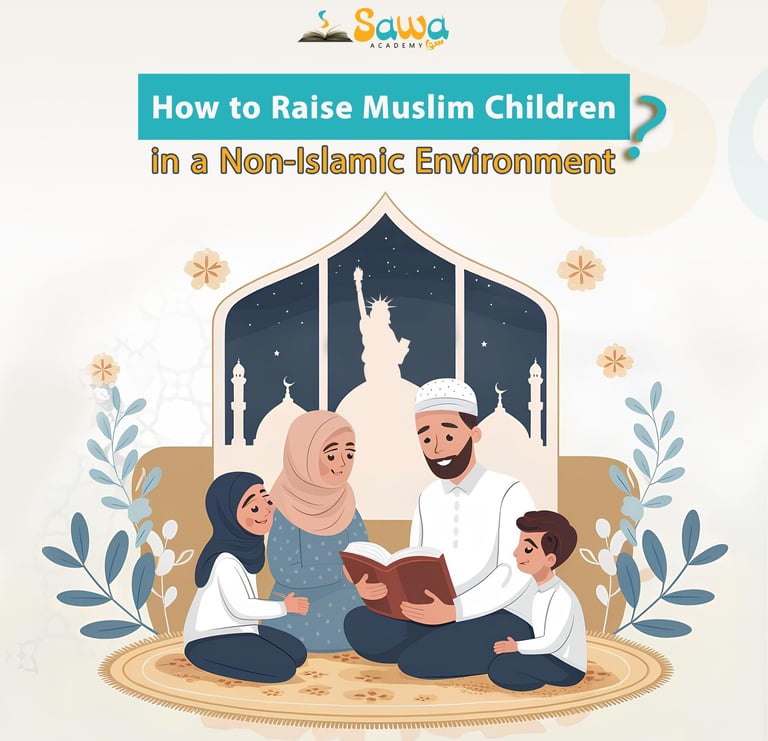
How to Raise Muslim Children in a non-Islamic Environment
Guiding Muslim parents with practical advice to raise children with strong faith in a non-Islamic environment
Azza Amer
12/7/20243 min read


Raising children in a non-Islamic environment is one of the biggest challenges Muslim parents face today.
How can we help our children stay connected to their faith when the world around them feels so different? The answer is to keep their Islamic identity strong while preparing them to lead a confident life with kindness in their hearts.
1. Filling Home With Faith
Allah SWT says: “O you who have believed, protect yourselves and your families from a fire whose fuel is people and stones” (Quran 66:6). This ayah tells us that caring for our children’s religious growth is a very important duty.
Turn your home into a calm, loving place focused on Islam. Let praying together as a family, reading the Quran daily, and talking openly about Islamic teachings be normal parts of everyday life. In this kind of home, faith grows naturally and becomes strong.
2. Deepening Connections With Allah
Helping children love their faith is not just about rules and rituals.
It’s about helping them feel close to Allah. Show them that Islam is not simply a list of do’s and don’ts—it’s a path to peace, purpose, and guidance. Tell them stories of prophets who faced hard times and still trusted Allah. Remind them of the ayah: “Indeed, with hardship comes ease” (Quran 94:6). This helps them know that Allah promises hope, especially when things are tough.
3. Clear Thinking and Talking openly
Children today are exposed to immoral ideas that can mislead them. Instead of trying to remove these topics and not allow them to talk about it, help your children learn how to handle these new thoughts wisely.
Teach them to think carefully about what they hear, compare new ideas with Islamic values, and ask questions openly. The Prophet Muhammad (peace be upon him) said: “A father gives his child nothing better than a good education” (Sunan al-Tirmidhi).
A good education includes understanding Islam deeply and learning about the world, so they can live with confidence and faith.
4. Confidence In Muslim Identity
To keep their faith strong, children need to feel proud of being Muslims. Teach them about the rich history of Islam and how Muslims have shaped the world.
Let them learn about prophets, scholars, and leaders who followed Islam and did great things. Surround them with people who show Islamic values in their actions—friends, family members, and community members who are kind and honest.
Take them to community gatherings, Islamic classes, or youth programs. Sawa Academy offers structured learning and supportive guidance, helping your children deepen their understanding of Islam and feel more connected to the global Muslim community. This all helps them know they belong to a caring ummah.
5. Leading by Example
Children learn best by watching what you do. If they see you praying on time, being honest, patient, and helpful to others, they will want to be like you.
Show them how to live their faith daily, be proud, and respectfully interact with everyone. When children see their parents leading by the guidance and teachings of Allah SWT and the Prophet PBUH, they understand that faith is not just words—it’s a way of life.
6. Faith in Allah’s Promise
Raising children with strong faith in a world full of different beliefs can feel difficult, but remember that Allah supports those who trust Him. Allah says: “And whoever relies upon Allah—then He is sufficient for him” (Quran 65:3). If we do our best, teach our children with love, and trust Allah, He will help us guide them correctly.
In the end, our goal is clear. By helping our children love their faith, understand their Islamic identity, and stay strong even when facing new challenges, we raise a generation that will carry Islam forward.
With patience, sincerity, and trust in Allah, we can guide them to a future where their faith shines brightly wherever they go.
